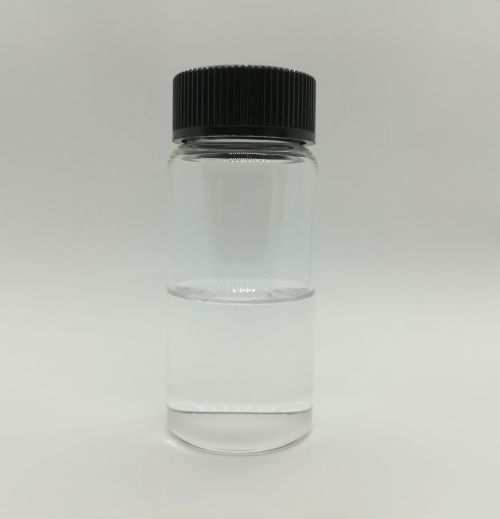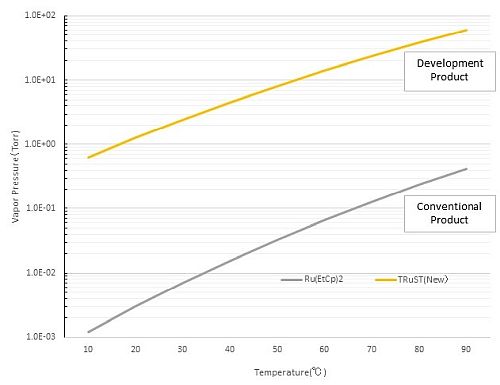
 |
 |
During this precursor development, TANAKA Kikinzoku Kogyo focused on material design and synthesis research, while Professor Soo-Hyun Kim, Ph.D., School of Materials Science and Engineering, College of Engineering at Yeungnam University in South Korea, researched to optimize the film formation characteristics.
Technologies developed through this collaboration will help increase performance and reduce energy consumption for the semiconductor devices used in smartphones, computers, and the data centers where demand is to grow well into the future.
Precursors are metal-organic compounds used in chemical vapor deposition (CVD), atomic layer deposition (ALD) and other processes to form thin metal films or metal wiring on substrates. CVD and ALD processes enable the formation of films with superior step coverage on various types of base substrate. These are useful methods for forming films as semiconductors become increasingly miniaturized, with increased structural complexity, and narrower wires with every new generation.
TANAKA Kikinzoku Kogyo has developed a range of precious metal precursors over the years, including ruthenium precursors. This time, computer simulation and other techniques were used to achieve miniaturization and optimization of the molecular structure. This resulted in the successful development of a precious metal compound in a liquid form, with high vapor pressure, and thermal stability suited for film formation, all of which are important characteristics for precursors. As a result, this compound has the world's highest vapor pressure over 100 times higher than that of previous liquid ruthenium precursors. The higher the vapor pressure of precursors and the smaller their molecular structure, the higher the possible concentration of precursor in the film formation chamber, and the greater the adsorption density of precursor molecules on the substrate surface. Compared to previous precursors, this achieves excellent step coverage and improved film formation speed.
According to research carried out at Yeungnam University, ALD film formation at approximately 1.7 angstrom (A) per cycle is possible, which is the world's fastest of its type using liquid ruthenium precursor. Also, specific resistivity after film formation is approximately 13 microhm-cm, which is close to the value of bulk ruthenium metal (7.6 microhm-cm).
When bulk ruthenium is used for vapor deposition, with a temperature as high as 3000 degrees C. However, if it is converted into an organometallic compound of ruthenium precursor, it can be vaporized at low temperatures (between room temperature to 200 degrees C) under vacuum. As a result, the formation of high-quality ruthenium film with excellent step coverage at high productivity is expected. This has been an issue in the past because it is technically difficult to achieve all these characteristics at the same time. With the development of "TRuST" however, it is now possible.
Samples of Shipments of "TRuST" should begin shipping samples are planned to start in October 2020.
Background and TANAKA Kikinzoku Kogyo's development of precursor for CVD/ALD processes
In the past, the most common wiring materials used for semiconductors were copper, tungsten and cobalt. However, as semiconductors have evolved, there are increasing expectations for the precious metal ruthenium to promote further miniaturization of semiconductors because of its lower resistance and higher durability. With its superior characteristics, ruthenium is also being considered for use in transistor gate electrodes and DRAM capacitor electrodes.
The progress of technologies such as IoT, AI, and 5G over recent years has led to rapidly increasing volumes of digital data used in clouds, smartphones, and computers. Therefore, the need for even greater miniaturization of semiconductors is increasing to enable the creation of devices with higher performance and lower energy consumption. As a specialized manufacturer of precious metals, TANAKA Kikinzoku Kogyo will continue contributing to this evolution of semiconductors through the development of high-quality semiconductor materials.
With the support of Professor Soo-Hyun Kim, from the College of Engineering at Yeungnam University, a researcher from TANAKA Kikinzoku Kogyo will give a presentation of this technology at the "International Interconnect Technology Conference (IITC) 2020", which will be held online from October 5-8, 2020. The title of the presentation is High-growth-rate atomic layer deposition of high-quality Ru Using a Novel Ru metalorganic precursor.
[1] Chemical vapor deposition (CVD): CVD is a chemical film formation method. It is a method of forming thin metal films on the surfaces of base materials or substrates through a chemical reaction induced and accelerated by directing energy, in forms such as heat, plasma and light, at gaseous vapor material fed into a reaction chamber at pressures between atmospheric pressures to medium vacuum pressures (100-10-1 Pa).
[2] Atomic layer deposition (ALD): Both CVD and ALD are film formation methods that use chemical reactions inside reaction chambers to deposit material onto substrates through the vapor phase. The main difference between the two methods is that while CVD continually forms atomic and molecular layers, ALD forms the layers intermittently one layer at a time.
[3] Precursors: Precursors are compounds used as the raw material for forming thin metal films and metal wiring on substrates.
TANAKA Holdings Co., Ltd. (Holding company of TANAKA Precious Metals)
Headquarters: 22F, Tokyo Building, 2-7-3 Marunouchi, Chiyoda-ku, Tokyo
Representative: Koichiro Tanaka, Representative Director & CEO
Founded: 1885
Incorporated: 1918*
Capital: 500 million yen
Employees in consolidated group: 5,138 (FY2019)
Employees: 221 (March 31, 2020)
Net sales of consolidated group: JPY 1,149,604 million (FY2019)
Main businesses of the group: The holding company at the center of TANAKA Precious Metals responsible for strategic and efficient group management and management guidance to group companies.
URL: https://www.tanaka.co.jp/english/
* TANAKA Holdings adopted a holding company structure on April 1, 2010.
TANAKA Kikinzoku Kogyo K.K.
Headquarters: 22F, Tokyo Building, 2-7-3 Marunouchi, Chiyoda-ku, Tokyo
Representative: Koichiro Tanaka, Representative Director & CEO
Founded: 1885
Incorporated: 1918
Capital: 500 million yen
Employees: 2,393 (as of March 31, 2020)
Sales: JPY 992,679,879,000 (FY2019)
Main businesses: Manufacture, sales, import and export of precious metals (platinum, gold, silver, and others) and various types of industrial precious metals products.
URL: https://tanaka-preciousmetals.com
About TANAKA Precious Metals
Since its foundation in 1885, TANAKA Precious Metals has built a diversified range of business activities focused on precious metals. TANAKA is a leader in Japan regarding the volumes of precious metals handled. Over the course of many years, TANAKA has not only manufactured and sold precious metal products for industry but also provided precious metals in such forms as jewelry and resources. As precious metals specialists, all Group companies within and outside Japan work together with unified cooperation between manufacturing, sales, and technological aspects to offer products and services. Additionally, to make further progress in globalization, TANAKA Kikinzoku Kogyo welcomed Metalor Technologies International SA as a member of the Group in 2016.
As precious metal professionals, TANAKA Precious Metals will continue to contribute to the development of an enriching and prosperous society.
The five core companies that make up TANAKA Precious Metals are as follows.
- TANAKA Holdings Co., Ltd. (pure holding company)
- TANAKA Kikinzoku Kogyo K.K.
- TANAKA Denshi Kogyo K.K.
- Electroplating Engineers Of Japan, Limited
- TANAKA Kikinzoku Jewerly K.K.
Press release in PDF: http://www.acnnewswire.com/clientreports/598/20200930.pdf
Press Inquiries
TANAKA Holdings Co., Ltd.
https://tanaka-preciousmetals.com/en/inquiries-for-media/
Contact:
Copyright 2020 ACN Newswire. All rights reserved. www.acnnewswire.com